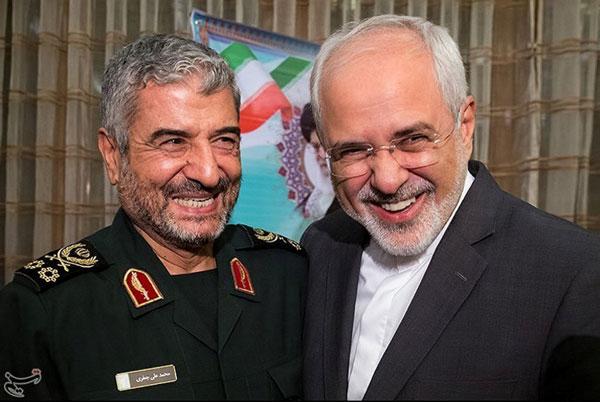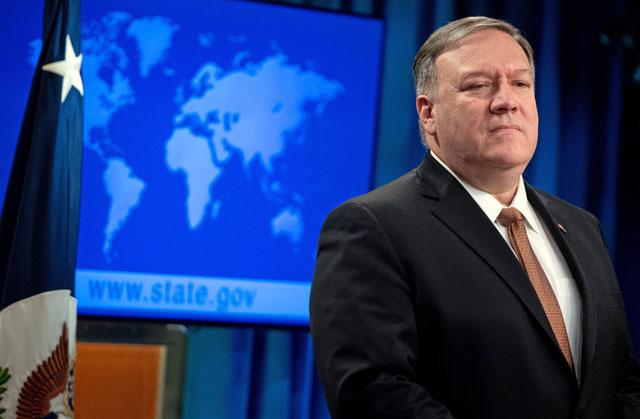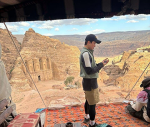You are here
Iran hardliners, pragmatists show unity in response to Trump
By Reuters - Oct 10,2017 - Last updated at Oct 10,2017

Islamic Revolutionary Guard Corps (IRGC) Commander Mohammad Ali Jafari (left) and Iran’s Foreign Minister Mohammad Javad Zarif smile during a coordination meeting for the 40th anniversary of the Islamic Revolution, in Tehran, Iran, on Monday (Reuters photo)
LONDON — A tough line from President Donald Trump has been met by a show of unity from both sides of Iran’s political divide, uniting hardliners who cast the United States as an implacable enemy with pragmatists who seek rapprochement with the West.
Iran, which has kept up a steady drumbeat of hostile statements for days, lashed out again on Tuesday, threatening to teach the Americans “new lessons” and keep “all options on the table” if Washington blacklists its Revolutionary Guards.
Trump, who has accused his predecessor Barack Obama of being too soft on Iran, is expected to announce a hardening of policy this week, likely to include “decertifying” a landmark 2015 deal that lifted international sanctions in return for curbs on Tehran’s nuclear programme. Such a step would stop short of pulling out of the agreement, leaving that decision to Congress.
Trump is also expected to designate Iran’s most powerful security force, the Islamic Revolutionary Guards Corps (IRGC), as a terrorist organisation. The IRGC has a vast economic empire in Iran, and blacklisting it could make it more difficult for Iranian businesses to access the global financial system.
“It seems the Trump administration understands only swear words, and needs some shocks to understand the new meaning of power in the world,” Iranian armed forces spokesman Masoud Jazayeri, who is also a Revolutionary Guards commander, said.
“The Americans have driven the world crazy by their behaviour. It is time to teach them a new lesson.”
Several Iranian newspapers ran the same photo on the front page on Tuesday: the urbane, US-educated Foreign Minister Javad Zarif laughing and hugging the commander of the IRGC, Major-General Mohammad Ali Jafari, in a striking display of unity between the two main factions of Iran’s leadership.
“We have a similar stance but different ways of saying it,” the papers quoted Jafari as saying.
Iran’s moderate President Hasan Rouhani won reelection less than five months ago after a campaign in which he called for better ties with the outside world and reform at home, openly criticising the influence of the IRGC which he accused of backing his hardline opponent. But the moderates and hardliners tend to rally together in public when threatened from abroad.
“The Americans are too small to be able to harm the Revolutionary Guards,” Ali Akbar Velayati, the top adviser to Iran’s Supreme Leader Ayatollah Ali Khamenei was quoted as saying by ISNA. “We have all options on the table. Whatever they do, we will take reciprocal measures,” he added.
The Iranian nuclear deal, backed by European countries, China and Russia, lifted broad international sanctions over Iran’s nuclear programme that had been tightened during the Obama years and had caused severe damage to Iran’s economy.
But Washington still maintains separate unilateral sanctions over Tehran’s missile programme and over allegations it supports terrorism. The lingering US sanctions have slowed Iran’s reemergence into the world economy, making global banks reluctant to take on business with Iranian firms despite the nuclear deal.
The United States already blacklists some individuals and entities for supporting IRGC activities, but not the guards themselves. Designating the guards as terrorists could make it more difficult for Iranian businesses to take advantage of the lifting of the international sanctions, since banks are required to verify that their clients are not on terrorism blacklists.
Iran’s rial has dropped against the US dollar in recent days in a sign of concern about Trump’s policy. The rial was quoted in the free market around 40,400 to the dollar, currency exchangers in Tehran told Reuters, compared to 39,200 last week. Several exchangers said they had stopped selling dollars from Monday and were waiting to assess the trend in the market.
The government told Iranians on Tuesday it would not let the decisions of the “mentally unstable” Trump affect the market.
“Trump might say some things by the end of the week, but this should not create chaos in the market. Iran is a stable country, and nothing will happen,” government spokesman Mohammad Baqer Nobakht said in a weekly news conference.
Washington aims to put more pressure on the IRGC, especially over its missile programme. Trump said in September that recent IRGC missile tests illustrated the weakness of the nuclear deal.
Iran says the nuclear deal does not require it to restrict its missile programme. Zarif, the Iranian foreign minister, said Iran purposefully excluded military capabilities from the pact, as “it is not intended as leverage or a bargaining chip in future negotiations”. In an article published in the Atlantic on Monday, Zarif added: “No party or country need fear our missiles — unless it intends to attack our territory.”
Related Articles
DUBAI — Iran’s top authority Supreme Leader Ayatollah Ali Khamenei has replaced the head of the influential revolutionary guards corps, stat
WASHINGTON/DUBAI — US President Donald Trump on Monday branded Iran's elite Islamic Revolutionary Guard Corps (IRGC) a terrorist organisatio
ANKARA — Donald Trump’s victory and the war on the Daesh terror group have given Iran’s hard-line Islamic Revolutionary Guard Corps (IRGC) w
















